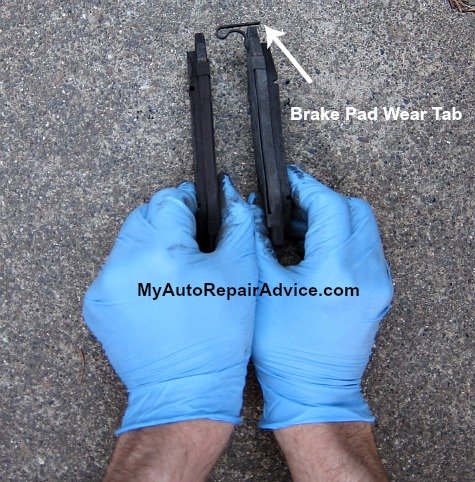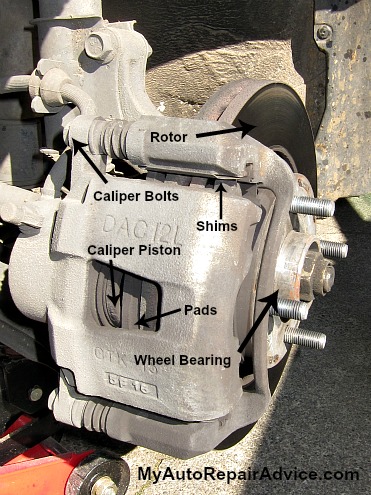Brake Noise Problems
More than being an annoyance, brake noise when stopping or slowing down can pose a real danger to drivers. Whether your brakes are making a grinding, squeaking or screeching noise, my guide below will help you figure out what is causing the noise and whether it is dangerous.
Why is My Brake Making Noise?
Brake Rotor
If there is rust buildup on the rotor or if there is rocks or debris
stuck in the brake pads that contact the rotor, it lead to noisy brakes. This noise is usually the loudest when the brake are being applied.
Caliper Bolts
These bolts need to be lubricated
because they have slides on them that can cause noises if they get dry.
This is not a common cause of noisy brakes, but it does happen. Many
repair shops will replace the caliper bolts during a brake job, but if
it is a cheap brake job then they won't replace them.
Brake Shims
Shims need to be replaced at every brake job. Sometimes a shop overlooks this or they just want to get the job done quickly so they don't replace them.
This can cause problems. The shims will wear down and eventually wear completely through. This will sometimes result in a piece of the shim coming in contact with the rotor or another part of the brake system, causing a metal on metal brake noise whenever the vehicle is moving. Any good brake pad kit will come with new shims to install.
Caliper Piston
Dirt or debris stuck in between the piston and the brake pads and cause the brake to make noise. If the back of the brake pads were not lubricated during installation, then the caliper piston and pads will be metal on metal and that will cause noise as well. This is also not a common cause of noise but it can happen.
Brake Pads
There needs to be lubrication on parts of the pad that is sliding or in contact with the metal parts on the brake caliper. If this lubrication is not there, it will likely lead to the brakes making noise at some point. When it comes to brakes, any time there is metal on metal contact (with the exception of the pads and rotors), there will be noise unless there is lubrication between the two pieces.
Wheel Bearing
This is not a likely cause of brake sounds, but it is still worth mentioning. If you hear a grinding brake noise coming from the area around your
wheels... and especially if you notice a vibration that gets louder or
quieter when turning, then it's likely that you have a wheel bearing problem.
Wear Tabs

Most brake pads come with wear tabs (see image above). These are small metal tabs attached
to the brake pads that are meant to come into contact with the rotors
before the pads wear completely out. This is the most common cause of
brake noise and simply means that you need to get your brakes replaced
in the next few weeks.
How to Get Rid of Brake Noise
If you notice your brakes making random noises or acting differently, then it's high time to check them out.
To troubleshoot, repair and maintain your vehicle, you'll need diagnostic and repair information that is specific to your car or truck. For this I personally use and recommend ALLDATAdiy. With full manuals for over 30,000 vehicles online, you will find an exact match for your vehicle's year, make and model.
Besides being cheaper than a factory manual, they also offer step by step repair instructions and detailed diagrams beyond what is found in most printed manuals. Click here for a sample of their diagnostic and repair information.
Inspecting your vehicle brake for brake noise problems is a simple DIY procedure. You just have to remove the wheels and look around the brake caliper and rotor with a bright flashlight. Compare it to the diagrams and photos in your repair manual and see if there is anything out of place.
BRAKE PROBLEMS - Causes and Fixes

New! Comments
Have your say about what you just read! Leave me a comment in the box below.